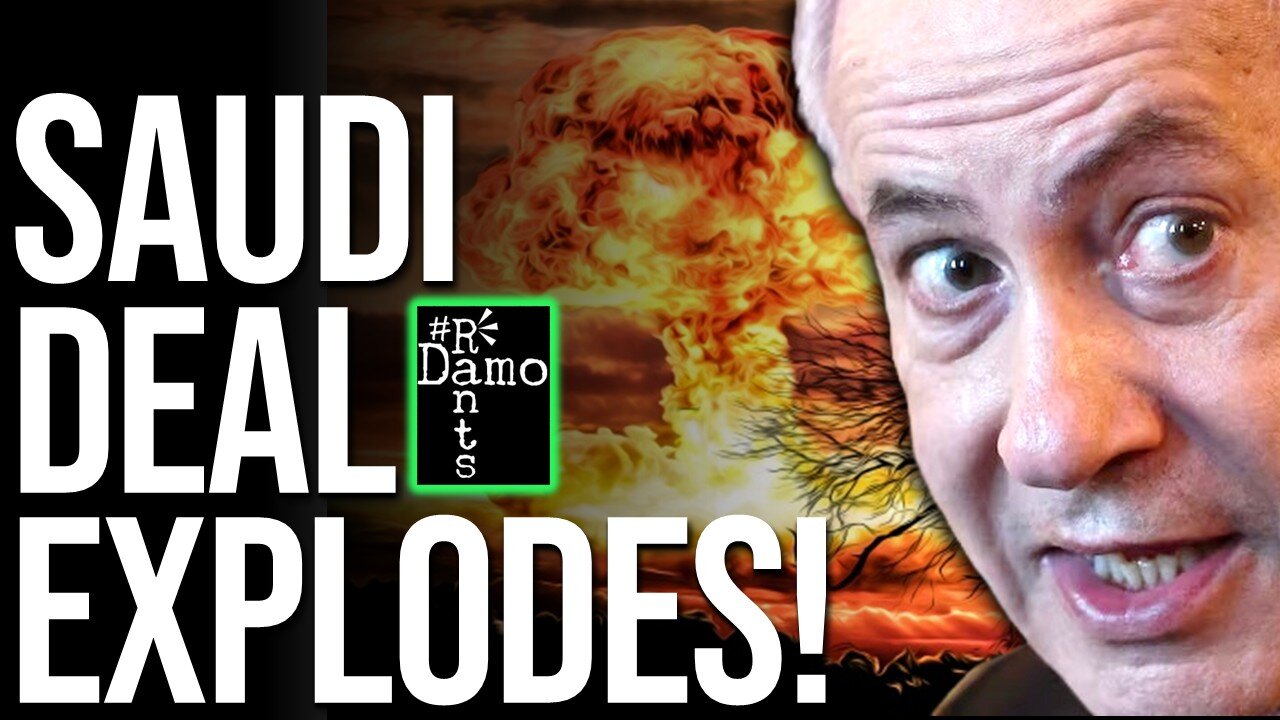Premium Only Content

Saudi Arabia Says No to Israel – And Yes to Nukes?
Right, so the Abraham Accords were supposed to climax with Saudi Arabia signing up to them. They were the great prize, the crown jewel, the stamp of legitimacy that would bury Palestine, give Trump bragging rights for days, and crown Netanyahu as some sort of a master strategist. Instead, Tel Aviv managed to blow up its own victory parade with all the subtlety of a dynamite vest. Bombing Doha during ceasefire talks was sold as “self-defence,” but the only thing Israel defended was its reputation as the region’s most reckless arsonist. The result has been a spectacularly bad set of events for Israel courtesy of the Saudis now. Mohammed bin Salman walked away from the notion of normalisation and straight into the arms of Pakistan — the one ally Israel never wanted Riyadh to touch, a nuclear-armed Muslim state. What was supposed to be Netanyahu’s power move against Hamas, has become a total humiliation and for a state that bleats that everything it does is in the name of its own security, They’ve achieved the polar opposite. Another fine Netanyahu made mess.
Right, so history has a way of exposing hubris. For the better part of two years, Israel strutted on the global stage as if it were on the verge of its greatest diplomatic triumph. The story went something like this: Saudi Arabia, the great prize of the Arab world, the custodian of Mecca and Medina, the linchpin of oil and legitimacy, was finally about to normalise relations with Tel Aviv. The Abraham Accords, launched in 2020, were supposed to be the prelude. The United Arab Emirates and Bahrain played the role of pioneers, Morocco and Sudan were folded in as proof of momentum, and all eyes turned to Riyadh. Netanyahu made it clear: the day Saudi Arabia joined the Accords would be the day Israel secured its place as the indispensable power in the Middle East. Western capitals echoed that line, eager to believe it, their pet project in the middle East had come good.
But that illusion has been spectacularly shattered. The Crown Prince of Saudi Arabia, Mohammed bin Salman, did not sign a peace deal with Israel. He signed a mutual defence pact with Pakistan instead — the only Muslim nuclear power, a country that has never recognised Israel, and which has defined much of its post-independence foreign policy around opposition to Zionism. The kick in the teeth could not have been clearer.
It was more than a snub. It was a total reversal, a rebuke, and a revelation all at once. At the very moment Netanyahu promised his people a breakthrough, Israel has found itself more isolated than ever. The pact was not merely about Riyadh and Islamabad. It was about normalisation detonated, about Israel’s recklessness in Doha boomeranging back, about the unreliability of the United States as a protector, and about a shifting balance of power in which Saudi Arabia now prefers to hedge with a Muslim ally rather than embrace Tel Aviv.
So to understand how we arrived here, lets dissect this pact, the choice of Pakistan, the collapse of the Saudi–Israel track, and the wider implications for regional strategy, because none of this has happened by accident, but as the consequence of choices — choices made in Gaza, in Doha, in Washington, and in Riyadh.
So the first question to ask is simple: what does the pact actually say? What have the Saudis and Pakistan cooked up between them? On 17 September, in Riyadh, in the presence of Mohammed bin Salman and Pakistani Prime Minister Shehbaz Sharif, the two governments signed what they called the Strategic Mutual Defence Agreement. The text pledged that any aggression against one would be treated as aggression against the other. It promised joint deterrence, deepened defence cooperation, and a shared front against external threats. Saudi outlets hailed it as historic. International observers noted the gravity. What struck most analysts was not the boilerplate about friendship, but the explicit language of mutual defence, rarely used outside of NATO-style treaties.
What raised eyebrows further was the nuclear shadow that is cast across this. Pakistan’s Defence Minister said bluntly that his country’s nuclear programme could be made available to Saudi Arabia under the pact. He did not spell out what that meant, and perhaps that was the point. The ambiguity itself is the deterrent. What ifs and maybes have always been the language surrounding nukes. Saudi Arabia, long suspected of financing parts of Pakistan’s nuclear development in the 1970s and 1980s, now had in writing a defence treaty with the only Muslim nuclear power. Israel has always relied on its unspoken nuclear monopoly, never admitted but widely understood, as the cornerstone of its strategic dominance. Now, for the first time, another state in the region had a credible claim to nuclear deterrence through alliance, even if no warhead ever crossed the Arabian Sea. For Tel Aviv’s planners, that uncertainty now is poison.
The second question follows naturally: why Pakistan, and why now? Saudi Arabia could, in theory, have deepened ties with the United States, renewed military guarantees with France, or leaned more heavily on Egypt. Instead, it chose Pakistan. That choice makes perfect sense if you consider history, legitimacy, and leverage. Since the 1980s, Pakistani troops have been stationed on Saudi soil, providing a quiet but steady backstop for the kingdom’s security. Pakistani pilots have flown Saudi aircraft, Pakistani officers have trained Saudi soldiers, and Pakistani defence academies have educated Saudi cadets. The financial flows have always gone the other way: Riyadh bailing out Islamabad in moments of crisis, providing cheap oil and direct cash support. So the relationship is not new. It is already embedded.
Pakistan also provides what no Western ally can: religious legitimacy. For Mohammed bin Salman, to tie Saudi Arabia’s fate further to Washington or Tel Aviv is to invite accusations of betrayal from some quarters. His claim to domestic and regional leadership depends in part on his guardianship of the holy sites of Mecca and Medina. To embrace Israel at a time of genocide in Gaza would be a political catastrophe. To tie Saudi defence to Pakistan, by contrast, is to reinforce his Islamic credentials. In the eyes of the Muslim world, this is not dependency on the West; it is partnership with a brother state.
And then there is leverage. Saudi Arabia does not want to build its own nuclear programme — the costs, the sanctions, the international outrage would be prohibitive. But by binding itself to Pakistan, Riyadh gains the benefits of nuclear ambiguity without the risks of proliferation. It can hint, credibly, that in a crisis it would have nuclear protection. That hint alone changes the calculus for its adversaries. They might have just killed off Netanyahu and the hard right of his coalition’s dreams of Greater Israel as we know it.
The third question is whether this pact is aimed at Iran or Yemen in part too, some might well question this. On the surface, you could argue it could be. After all, Iran has been Saudi Arabia’s great rival, and the Houthis have rained drones and missiles on Saudi oil infrastructure in the past. Yet the evidence no longer backs that up. Since March 2023, Saudi Arabia and Iran have been engaged in a diplomatic thaw, brokered by China. The reopening of embassies was followed by direct meetings and that has included Mohammed bin Salman hosting senior Iranian figures such as Ali Larijani in Jeddah at the same time this pact was being signed with Pakistan, talks involved in deepening ties between the Saudis and Iran. That is not the behaviour of a state preparing for war with Tehran. The Houthis, meanwhile, are in the middle of a truce that has held since 2023. They are not striking Aramco plants or airports in Saudi Arabia; they are targeting Israel’s ports and Red Sea shipping instead. So for Saudi Arabia, the threat from Yemen has been placed on ice, it’s not immediate, it didn’t necessitate this pact in itself.
So if not Iran or Yemen, then the answer can only be Israel itself and the United States. Saudi Arabia has watched Israel grow increasingly reckless. It has watched Washington prove increasingly unreliable and therefore it has chosen to insure itself with someone else.
The unreliability of the United States is not new though. It was exposed in 2019, when Houthi drones struck the Abqaiq facility and knocked out half of Saudi oil production. Donald Trump hesitated. He threatened sanctions, but he did not commit to retaliation. For Riyadh, that was the moment the scales fell from the eyes. The decades-old assumption — that American power was the ultimate guarantor of Saudi security — collapsed in the smoke rising over Abqaiq. Since then, the doubts have only deepened. Biden’s administration was ambivalent, torn between arms sales and pressure over human rights. Washington’s strategic gaze has shifted to Asia. Saudi Arabia has been left to wonder whether, in its moment of need, the United States would truly act.
And then came Israel’s strike on Doha on 9th September. Israeli jets bombed the Qatari capital, killing Hamas leaders engaged in ceasefire talks. It was a violation of sovereignty, an act of aggression in a Gulf capital, and a blunder of staggering proportions. Qatar condemned it as terrorism. Arab and Islamic states gathered for an emergency summit. Draft resolutions warned it threatened normalisation itself. Analysts called it a shock that forced the Gulf into a new reckoning. For Mohammed bin Salman, it was the end. To sign a normalisation deal with Israel after such an act would have been political suicide.
And what made it worse — what made it almost laughable in its grotesquery — was the excuse. Israel claimed the strike on Doha was “self-defence.” As if bombing a Gulf capital during ceasefire talks was anything other than state terrorism. As if killing negotiators in a neutral city was a legitimate extension of military necessity. It was a defence so absurd it collapsed under its own weight. Instead of frightening the Gulf into compliance, it ridiculed Israel on the world stage. Netanyahu thought he could frame Doha as a battlefield; instead, he detonated his own diplomacy.
The strike on Doha did more than inflame opinion. It crystallised a fear: if Israel could bomb Qatar, it could one day bomb Saudi Arabia. The illusion of control — that normalisation would bring stability — evaporated. Instead, Israel looked like a liability. At the very moment Netanyahu hoped to secure his greatest prize, he destroyed it with his own hands.
All of this unfolded against the backdrop of Gaza. The dehumanisation of Palestinians, has allowed Israel to commit atrocities in plain sight. Palestinians are treated as less than human, their suffering as acceptable collateral. It is a defence so outrageous it should be laughed out of every chancery on Earth. But instead, Western leaders nod along bought and paid for as they are.
For Mohammed bin Salman, whose claim to legitimacy rests on his role as custodian of Islam’s holiest sites, to embrace Israel in this moment would have been calamitous. He may be ruthless, but he is not blind and he is not stupid. Instead, he chose Pakistan. By doing so, he rebranded Saudi Arabia as the defender of the Muslim world rather than the collaborator with its oppressor. He gave himself cover, prestige, and insurance. And he gave Israel a problem it cannot solve.
For Israel, the consequences are severe. Its three strategic pillars are in ruins. First, the perception of American backing is weakened. If Saudi Arabia is hedging with Pakistan, others may well follow. Second, the pursuit of Arab normalisation has been detonated. Doha was the trigger; Israel pulled it; Riyadh’s pact with Islamabad is the burial. Third, Israel’s nuclear monopoly is under threat. Even the suggestion that Pakistan’s arsenal might shield Saudi Arabia undermines Israel’s most prized advantage.
But the ripple effects flow far wider. For Iran, this pact is reassurance for them: Saudi Arabia is not joining Israel’s camp. For the Houthis, it is confirmation that Riyadh seeks insurance, not escalation. For Turkey, it is a challenge: Saudi Arabia, not Ankara, is positioning itself as leader of the Muslim world. For India, it is a headache: any strengthening of Pakistan alarms Delhi and may push it closer to Tel Aviv, Modi already having signed a major investment agreement with Israel to his absolute shame. For China, it is an opportunity: Beijing has ties to both Riyadh and Islamabad and gains leverage in West Asia from their convergence.
So can it be argued that Saudi Arabia has turned on Israel? Not formally. Riyadh has not declared Tel Aviv an enemy. But in practice, yes. It has walked away from normalisation. It has tied itself to a Muslim nuclear power to protect itself from that state it was going to normalise ties with. It has raised the spectre of nuclear ambiguity to protect itself. It has positioned itself in opposition to Israel’s narrative. It has done so without ever naming Israel, but the effect is the same, because who else could it possibly be?
And here lies the tease, the dangling thread Israel cannot ignore. What happens next time? What happens the next time Israel bombs a neighbour’s capital under the guise of “self-defence”? What happens the next time Tel Aviv decides it can act with impunity, and Riyadh decides enough is enough? Will Pakistan’s shadow remain a rumour, or will it force Israel to think twice before pulling the trigger?
Israel wanted Saudi Arabia as the jewel of the Abraham Accords. Instead, it drove Riyadh into the arms of Islamabad. That is not just bad news for Tel Aviv. It is a humiliation. It is the moment the pretence collapsed, and the dream warped under the weight of arrogance. And the unanswered question — the one that hangs over every Israeli war room now — is whether the next reckless strike will not just backfire diplomatically, but summon a deterrent Israel has never had to face before.
It's not just Saudi Arabia that has found common cause with Iran lately though, the events of Doha have also led to common ground being found where it comes to Israel between Iran and Egypt as well, Egypt who keep the gates of Rafah shut and provide cover for Israel have also been pushed too far it seems. Get all the details of that story in this video recommendation here as your suggested next watch.
Please do also hit like, share and subscribe if you haven’t done so already so as to ensure you don’t miss out on all new daily content as well as spreading the word and helping to support the channel at the same time which is very much appreciated, holding power to account for ordinary working class people and I will hopefully catch you on the next vid. Cheers folks.
-
 1:06:09
1:06:09
Man in America
18 hours agoExposing HAARP's Diabolical Mind Control Tech w/ Leigh Dundas
73.5K75 -
 1:47:16
1:47:16
Tundra Tactical
14 hours ago $113.50 earnedGlock Interview From Beyond The Grave//Whats the Future of Home Training??
61.2K12 -
 2:16:35
2:16:35
BlackDiamondGunsandGear
12 hours agoEBT Apocalypse? / Snap Down SHTF / After Hours Armory
27.7K13 -
 14:05
14:05
Sideserf Cake Studio
1 day ago $19.00 earnedHYPERREALISTIC HAND CAKE GLOW-UP (Old vs. New) 💅
69.5K12 -
 28:37
28:37
marcushouse
1 day ago $10.94 earnedSpaceX Just Dropped the Biggest Starship Lander Update in Years! 🤯
36K17 -
 14:54
14:54
The Kevin Trudeau Show Limitless
3 days agoThe Hidden Force Running Your Life
124K28 -
 2:16:35
2:16:35
DLDAfterDark
13 hours ago $15.46 earnedIs The "SnapPocalypse" A Real Concern? Are You Prepared For SHTF? What Are Some Considerations?
37.9K15 -
 19:58
19:58
TampaAerialMedia
1 day ago $10.96 earnedKEY LARGO - Florida Keys Part 1 - Snorkeling, Restaurants,
50.6K23 -
 1:23
1:23
Memology 101
2 days ago $10.53 earnedFar-left ghoul wants conservatives DEAD, warns Dems to get on board or THEY ARE NEXT
39.6K80 -
 3:27:27
3:27:27
SavageJayGatsby
14 hours ago🔥🌶️ Spicy Saturday – BITE Edition! 🌶️🔥
63.7K7